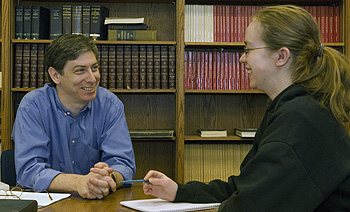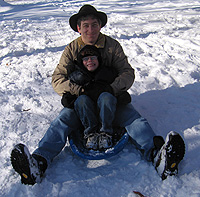He’s been known to launch a lecture with the “Davy Crockett” theme song, tap academic potential in students before they realize it in themselves and convert physics majors to scholars of the American frontier.
Peter J. Kastor, Ph.D., knows how to bring a classroom to life.

Photo by David Kilper
Peter J. Kastor, Ph.D., associate professor of history and of American culture studies, both in Arts & Sciences, talks with Emma Eschenfeldt, a senior majoring in the Interdisciplinary Project in the Humanities in Arts & Sciences. “Peter genuinely cares more about teaching than any professor I’ve ever met,” says Megan Lindsay, a 2003 graduate who majored in history and American culture studies.
Kastor, associate professor of history and of American culture studies, both in Arts & Sciences, is a historian of the early American republic, roughly the half century following American independence. He studies the period’s politics, culture and institutions with a focus on how they have played out on the North American frontier.
“While my intellectual identity is as a historian, my programmatic identity lies in American culture studies, which takes a broad approach involving humanities, social sciences and natural sciences,” he says. “Every one of my research projects has emerged from the joint appointment.”
Kastor is completing a book on early American cartography and travel writing. Titled “William Clark’s World: Describing America in an Age of Unknowns,” the book is under contract with Yale University Press. Another book, “Empires of the Imagination: Transatlantic Histories of the Louisiana Purchase,” co-edited with Francois Weil, is under contract at the University of Virginia Press.
“Peter came to the University at a time when American culture studies was just beginning to figure out its academic purpose and methods,” said Wayne Fields, Ph.D., the Lynne Cooper Harvey Distinguished Professor in English and director of American culture studies, both in Arts & Sciences. “He played a vital role in this process and was especially helpful as we developed the technology applications that have proven so important to what we do. He is a valued colleague as well as a popular teacher, an invaluable member of the Washington University community.”
‘Americans and Presidents’
“Remember when you first went to summer camp?” Kastor asks. “What was rule No. 1? Have fun. This has been my rule in developing this new course.”
Kastor is talking about “Americans and Presidents,” which he began teaching in January.
“We found that most university courses on the presidency were based in political science, dealt with the modern presidency and focused on politics and policymaking,” Kastor says. “We wanted to offer something fresh.”
With research assistance from senior Sam Levine, Kastor took a cultural approach to examining the U.S. presidency, from George Washington to George W. Bush.
Levine, an American culture studies and history double major, says Kastor immersed him in research “so I could learn from the process and serve as a more valuable adviser.”
“I was struck by the imagination and creativity (Kastor) applied to developing this course,” Levine says.
Built around four themes — politics, policy, personality and posterity — the course capitalizes on the current election.
Kastor says of his decision to first offer the course as an advanced undergraduate seminar: “Juniors and seniors can handle the rough spots and fill in any gaps of a new course.”
The plan, he adds, is to slot the course as part of a sequence in the FOCUS program, which offers humanities-based study for freshmen.
“This semester, we’re talking about the candidates occasionally, but the fall semester will be tied more directly to the election,” Kastor says. “Students who take the freshman course in fall 2008 will also be able to take a follow-up research seminar in spring ’09 that will analyze the new administration.”
The fruits of this labor have sweetened Kastor’s research, particularly his work on the history of federal governance in the early republic.
“We know a lot about political theory, foundations of the Constitution, the ideas and ideologies of American leaders and the relationships between presidents and Congress,” Kastor says. “But we know very little about how legislation at a federal level was actually enacted.
“To understand this, you need to focus primarily on the executive branch and federal bureaucracies. I wanted to read material related to these areas, and I knew the course would force me to do just that,” he says.
|
Peter J. Kastor |
| Top vacation spots: Montana and the English countryside Favorite musical group: Derek and the Dominos Most eloquent presidential speech: George Washington’s farewell address Prized possession: Family photographs — “both those I’ve taken and the old slides my parents are now digitizing,” he says. |
There’s no doubt that students who sign up for the course will be engaged, according to Levine.
“The professor enlivens every class with his anecdotes, great sense of humor and absurdly expansive knowledge of bad films from the ’70s and ’80s,” Levine says.
United we stand
In another project, under contract with Congressional Quarterly Press, Kastor looks at how the United States has governed foreign people over time, first through territories now part of the United States and later through overseas and extraterritorial jurisdictions that have never become fully incorporated.
It’s a topic he explored in his dissertation, which later became the highly praised book “The Nation’s Crucible: The Louisiana Purchase and the Creation of America” (Yale University Press, 2004).
“Right after the American Revolution, given the ethnic differences and geographic breadth, people believed in pragmatic unity for specific reasons,” Kastor says. “‘What can unite us?’ they asked. Certainly not languages, religions, histories and cultures. These Americans chose a political option: belief in a republic.”
The challenge of territorial governance established a model for the way Americans think about expansion today, Kastor posits. “But the U.S. wavers between the fear and the comfort of having imperial holdings,” he says.
“The ways that the U.S. set about integrating territory into a national whole is programmatically very similar to the way Americans talk about the reconstruction of Iraq and Afghanistan,” Kastor says. “The U.S. introduces representative government, promotes economic stability and development and creates a system built around a political structure. The big question is, will these countries be our allies?
“In 1803-04, a member of Congress said there are two ways to govern: by force or affection. There is debate today on this very question. The criticism of policy in Iraq and Afghanistan says we’re governing by force. We are not a republic, but an empire. This is exactly what Americans were arguing 200 years ago. The principles of nationhood, which we take for granted, are deeply embedded in our culture,” he says.
An 18th-century world
In many ways, Kastor is a product of his environment.
“I grew up in Philadelphia, surrounded by an 18th-century world where the American Revolution, the founding of the republic and its political and social worlds converged,” he says. “This leaves a mark.”
Kastor earned a bachelor’s degree in history with departmental honors from Franklin & Marshall College in 1989. He earned master’s (1993) and doctoral degrees (1999) from the University of Virginia.
But it was his experience as a voting rights analyst for the U.S. Justice Department in Washington, D.C., from 1989-1990 that led him to study political and institutional history.
“Day in and day out, I was witnessing how districts were being created and rules established. I saw the gap between political understanding of governance and administrative reality. It was a quick and rough education that raised questions I began to ask about the early republic,” he says.
Kastor came to WUSTL as a postdoctoral fellow in American culture studies 10 years ago, intending to stay for two. He was charged with two tasks: help design a course on the Lewis and Clark Expedition and develop a technology program for teaching and research in the America Culture Studies Program.
“I was finishing my Ph.D. on the implications of territorial expansion when I learned that WUSTL faculty were conceiving this new course in the same way,” Kastor says. “A lot of things came together, American culture studies took off, and there were needs in history that I was able to fill.”

Courtesy Photo
Peter J. Kastor, with his son, Sam, 6, makes his most exciting discoveries on the frontiers of parenthood.
Over the past decade, Kastor has been the recipient of numerous honors, teaching and advising awards, grants and fellowships. He was awarded one of the first faculty fellowships (2005-06) at the Center for the Humanities in Arts & Sciences and has played a leading role in developing digital projects and building an infrastructure that enables other WUSTL faculty to create digital projects of their own.
“This work on digital projects reflects models of collaborative inquiry that I first saw while watching David Konig, Wayne Fields and Barbara Schaal team-teach a course during my first semester here,” Kastor says. “They gave me wonderful examples of how to think about what it means to be a part of the University community.”
One student at a time
Kastor has earned a reputation as a teacher nonpareil. He raises the bar to daring heights while creating a comfortable environment that invites competing ideas and opinions.
His course on the American frontier “showed this aspiring scientist how rich and alive the humanities are,” says Aaron Mertz, a Rhodes Scholar and 2006 graduate with double majors in physics and American culture studies, both in Arts & Sciences. “It provided the intellectual environment I had not yet found in college.”
“Peter genuinely cares more about teaching than any professor I’ve ever met,” says Megan Lindsay, a 2003 graduate who majored in history and American culture studies now in her third year of a doctoral program in American history at Yale University. “He always challenged us, welcomed our perspectives and treated us as academic colleagues.
“For more than two years, I met with him one hour a week to discuss my projects,” she says. “Those meetings did more for my education than all of the classes I have taken. Moreover, I felt that they represented the best of Washington U.: a warm, welcoming academic community that fosters academic growth one student at a time.”